- Home
- Franklin W. Dixon
Trouble Times Two
Trouble Times Two Read online
Contents
Chapter 1: The Troublemaker
Chapter 2: Stakeout
Chapter 3: Pros—and Cons
Chapter 4: Warm Welcome
Chapter 5: Better than a Movie
Chapter 6: Unexpected Results
Chapter 7: Where There’s Smoke . . .
Chapter 8: Two for the Executioner’s Block
Chapter 9: The Truth and Nothing But . . .
Chapter 10: Whistle-blow-up!
Chapter 11: Hits . . .
Chapter 12: . . . And Misses
Chapter 13: Desperate Moves
Chapter 14: Silent Partner
Chapter 15: Hot Times
1: The Troublemaker
Can’t fall asleep, Frank Hardy warned himself. Can’t let my eyes close. The second I do that, I’m doomed.
Even as he fought, Frank was losing the battle. The world became fuzzy through Frank’s brown eyes. Then it grew dark.
A slight, stinging sensation on his left cheekbone made Frank’s eyes pop open.
Turning to his left, Frank saw Callie Shaw seated at the desk next to his. She had lined up half a dozen tightly wadded tiny balls of paper. Her fingers were poised behind one of them, ready to flick it at him. Callie looked annoyed as she silently moved her lips. Frank could read what she was saying: “Stay awake.”
Frank tried, but everything was working against him. The classroom was too hot, and the stuffy air felt as if everyone else in class had breathed it before it got to him. As Mr. Bannerman, the social studies teacher, droned on, Frank decided he might as well have been speaking Klingon for all the sense he was making.
Frank’s eyelids began sliding shut again—until another spitball brought him around.
“You’ll find much more on the system of checks and balances in chapter seven of your textbook.” Mr. Bannerman pushed his glasses up on his nose, a hint that his lecture was finally coming to a close. “Read that for our next class.”
Frank glanced at the clock. There were still fifteen minutes before the period came to an end and lunch began. Mr. Bannerman stepped back to his desk and picked up a piece of paper. From where Frank sat, he couldn’t read it. It looked like an official letter, though.
The teacher cleared his throat. “I received a cheerful announcement from the school board today,” he said. “The members are pleased to announce a social science fair to be held six weeks from Saturday. All students will be expected to display projects in the school cafeteria.”
Frank noticed that the students in the class looked a lot less than pleased.
Mr. Bannerman went on. “Class members may work in teams of up to six students.” He glanced around. “Perhaps you’d like to spend the rest of the period choosing partners.”
Suddenly the room was bustling. Frank stood and stepped the short distance to Callie. Her blue eyes twinkled as she brushed back her blond hair. They were quickly joined by Phil Cohen, a grin on his thin, usually serious face.
“Good,” Callie murmured. “At least we have one bright person on our team.”
“Speak for yourself,” Frank replied as Kevin Wylie and Liz Webling also joined their group.
In moments the class had divided itself into six teams—and one lone figure.
Tom Gilliam sat slumped in his seat, his lips twisted in the half sneer he usually wore. He glanced around at his classmates as if they were a flock of sheep unquestioningly following their shepherd.
Frank returned his look. Tom had transferred to Bayport High in the middle of the quarter, but he already had a reputation as a troublemaker. Every class had a Tom Gilliam, someone who’d mouth off to teachers and find a way to disrupt classes. Tom Gilliam took things so far, though, that he hadn’t made a single friend at Bayort High. But someone had hung a mocking nickname on him that seemed likely to stick—Trouble Boy.
Mr. Bannerman stepped over to Tom, clearing his throat again. “I see you haven’t chosen a team, Mr. Gilliam.”
“That’s because nobody wants him.” Callie hadn’t meant her comment to be public, but her words came out in one of those moments of dead silence. Everyone heard, and the classroom filled with snickers and barely controlled laughter.
Frank could see that Tom had heard, too. His long, pale face went as red as his blazing hair.
Mr. Bannerman pretended nothing had happened. “Since you apparently can’t make a choice, I’ll do the job for you.”
The teacher’s eyes ranged the room, landing on Frank’s team. “This group here, I think.” His hand went for Tom’s shoulder to steer him, but the new kid was already out of his chair, almost flinching from Mr. Bannerman’s touch.
“Well, isn’t this just great?” Callie muttered, keeping her voice even lower than usual.
Tom Gilliam faced the group as if he expected fists to fly. He stood uncertainly for a moment, then the sneer came back to his face.
“Since you chose teams so quickly you can take the rest of the period to discuss topics.” Mr. Bannerman rustled the letter. “According to this, your project should deal with important subjects and movements of the past fifty years.”
“Fifty years,” Kevin Wylie repeated. “I wonder why they set up a cutoff date like that.”
“Because anything before that stops being social studies and becomes ancient history,” Tom Gilliam cut in.
Callie just ignored him. “So what do we do for a topic? What’s a big deal in the last fifty years?”
“Decline of unions?” Frank offered.
“The decline of newspapers?” Liz suggested, topping him.
Frank had to grin. Both Liz and her dad worked for the Bayport Gazette.
“I think we need something a little—um—hot,” Callie said.
“Like do parents have the right to block kids’ access to particular Web sites on the Internet,” Tom threw in.
“Maybe that’s a little too hot,” Frank said.
“So, do we want to do something with good guys and bad guys?” Callie asked. “Maybe something to do with crime?”
Kevin laughed. “Why not? We’ve got Mr. Detective here.”
Frank became uncomfortable. “I think we should go for something different,” he said. “Something nobody else would choose.”
“How about protests?” Kevin suggested. “There have been a lot of those in the last fifty years.”
“I bet nobody will think of that,” Tom said sarcastically.
“I saw something on the Net that might tie in with that,” Phil said. “This guy wrote a paper about people who protest by blowing the whistle, exposing corporate wrongdoing.”
“Whistle-blowers,” Callie said. “That’s different.”
Liz nodded. “Like that guy who ripped the lid off the whole cigarette business. Pretty cool.”
Tom looked as if he’d bitten into a sandwich that had gone bad. “Come on. Guys who rat out their companies are real losers. Nutcases, or people about to lose their jobs.”
Frank glanced around the group. Callie, Kevin, Liz—everybody was glaring at Tom. Frank wasn’t surprised. Even he was getting tired of Tom’s smart mouth.
“I like this whistle-blowing thing,” Frank said.
“Me, too,” Callie snapped.
“Frank, Callie, Phil . . .” Kevin said. “I think my vote gives the whistle-blowers the majority.”
“And mine makes it almost unanimous,” Liz added.
“I think Tom may have a point,” Phil said. “So why don’t we work his idea into the project? We can explore the pro–whistle-blower point of view—and the opposite.”
“Yeah,” Frank agreed. “Tom here can head up the anti–whistle-blower team, Phil the pro.”
Tom just stood with his mouth hanging open. For once he didn’t
have a word to say—nasty or otherwise.
The bell finally rang, and everybody thundered out of the classroom. Frank and Callie stuck their books in their lockers and headed for lunch. Callie was still annoyed at Tom Gilliam. “We really have to thank Mr. Bannerman for sticking us with that guy,” she complained to Frank as they entered the cafeteria.
“Look at it from a teacher’s point of view,” Frank joked. “He wants to help Tom break out of his shell and enter the mainstream of school life.”
“Breaking and entering,” Callie muttered. “I bet there are lots of people who’d love to catch Gilliam doing that.”
“Hey, guys,” Frank’s younger brother, Joe, said as he joined them in line. “What’s the word?”
“I can’t remember. Are you taking social studies this year?” Callie asked.
The younger Hardy brother nodded his blond head.
“Oh, are you in for happy news,” Callie told him. “We have to do special projects. Actually, maybe it’s only for seniors. I don’t know for sure if juniors have to do it—”
Her report was interrupted by a shout from farther up the line. Then came the clatter of falling trays and plates.
Frank, Joe, and Callie all whipped around. None of them could believe their eyes. Their jock pal, big, beefy Biff Hooper, was staggering out of the food line.
And charging him, throwing a punch at his face, was Tom Gilliam.
2: Stakeout
“We have to stop this before they get in trouble,” Joe said. He moved to Biff, while Frank tried to stop Tom.
Joe definitely had the easier job. Biff wasn’t even fighting. He appeared almost dazed. “What’s with that guy?” he asked. “I just made a comment about his shirt, and he starts swinging at me.”
Biff put a hand to his jaw. “I have to admit, the guy throws a pretty good punch.”
A sudden yelp from behind Joe made him turn. Tom Gilliam had obviously been giving Frank a tough time. The older Hardy had thrown an arm-lock around Tom to keep him from coming at Biff. Gilliam was still struggling and wanted to continue the fight.
“Keep that up, and you’re going to break something,” Joe warned. “Not to mention getting nailed by Old—uh-oh.”
Joe was lucky to spot Mr. Sheldrake before calling the assistant principal by the name all the students used. “Old Beady Eyes” didn’t like his nickname. He also didn’t like fighting at school.
“Ah, Mr. Gilliam,” he said, not sounding at all surprised. “I see you don’t seem to listen to your warnings. Well, you’ve gone well beyond the warning stage now. This school does not tolerate brawls. The school board has set very stern guidelines.”
Joe watched as Frank released Tom and Mr. Sheldrake steered him toward the principal’s office.
• • •
There’s just no justice, Joe thought, glancing up at the sky as he headed home from the library. Tom Gilliam gets suspended from school and gets five days of beautiful weather. But when the weekend comes and we get off . . .
He looked again at the threatening clouds marching across the sky. The morning weather report had said nothing about rain. From the looks of things, though, Friday night was certain to be a washout.
Joe went down the block to the Hardy house and opened the door. Thanks to the clouds, very little light was coming in the windows. Joe moved through the gloomy first floor of the house, flicking on electric switches. “Anybody home?” he called out. “Or is everyone taking a nap?”
Frank appeared at the top of the stairs, silhouetted against the lights in his room. “It’s just the two of us—remember? Mom and Aunt Gertrude are off setting things up for a charity auction. And Dad—”
“That’s right. He’s on a stakeout.” Joe shot a look out the windows. “I hope they all took umbrellas.”
A sudden gust of wind sent the first spatter of rain against the glass.
A sudden thunderclap sent Frank rushing to his computer. “Better turn my computer off. Just my luck for it to get fried by lightning.”
The thundershower passed quickly, and the sky even cleared up for a while. Dinner was frozen Mexican food nuked in the microwave. The boys ate in the kitchen, talking about their projects.
“The terrorism thing my group chose for social sciences is turning out to be more interesting than I thought,” Joe said. “Did you know that Ho Chi Minh spent several years working as a waiter in France? Then he went back to Vietnam and built the organization that threw the French out of his country, not to mention giving the U.S. of A. a big headache.”
“That’s what my research is giving me.” Frank sighed. “I keep finding out how whistle-blowers lose their jobs and ruin their lives. And after all their sacrifices, they still end up not making a difference.” He gave Joe a lopsided grin. “Maybe I should switch over to the ‘anti’ side of the question with Tom Gilliam.”
Joe frowned. “You of all people think folks shouldn’t try to stop the bad guys?”
“Some of the stories I’ve found would make you wonder. I was just reading about an Australian cop who reported some of his co-workers for taking bribes. He was the one who got dumped off the force. Luckily, he was able to get the press interested and got some big bucks in legal damages.”
“So it turned out all right,” Joe said.
Frank shook his head. “Maybe all right financially, but this guy was never able to work as a cop again. And it turned out that the same corruption continued. The whistle-blower went through a lot of grief—for nothing.” He sighed. “And that was one of the better stories.”
“Frank, you’re bumming me out,” Joe said. “Cheer up! We’ve got a weekend ahead of us—”
He glanced out the window. The rain had started again—a steady drumming that didn’t look as if it would let up soon. “As long as we don’t get washed away.”
The phone rang, and Joe popped up from the table to get it. “Hardy residence,” he said.
“I’m glad you’re in,” his father’s voice said over the line.
“Dad! What’s up?” Joe asked.
“I’m downtown, staking out the old Harbor Hotel,” Fenton Hardy replied. “This change in the weather has caught me off guard.”
Wherever his dad was calling from, the raindrops were hitting him pretty hard. Joe could hear them even over the phone. “What do you need, Dad? An umbrella? Your trench coat?”
“What I really need is one of those plastic rain ponchos we picked up in the ninety-nine-cent-store,” Fenton Hardy said. “Not the fluorescent orange or the baby blue. Something on the dark side, if you can manage it.”
Joe remembered the rain gear his father was mentioning. They’d picked up a bunch of one-size-fits-all ponchos in a job lot store. For a joke, he’d modeled one. Frankly, he’d found thicker, stronger plastic in the better brands of garbage bags. “Are you sure?” he asked.
“It’s what I need to fit in around here.” Fenton gave Joe a pair of cross streets. “Pull up there, and I’ll signal you.”
“You’re the boss,” Joe said. He went down into the basement and rooted around in the “junk drawer” of his father’s office. It took a little digging to locate the rain ponchos, but he did and began sorting them. Yes, there were a couple in bright orange.
“Pretty ugly,” he muttered.
He turned up another poncho—this one in light green. And then pay dirt. The plastic raincoat was dark green—certainly the dingiest Joe had been able to find. The package was so small, he crammed it in his back pocket and headed up the stairs.
“Dad wants me to drop something off for him,” Joe told Frank. “Could I have the keys to the van, or do you want to drive?”
Frank dug the keys out of his pocket. “You go,” he said. “I’m going back on-line to try to find some happier whistle-blower stories.”
Joe caught the keys, then ran upstairs for a couple of items his father might appreciate, even if he hadn’t asked for them. He came back down with a small bundle, grabbed an umbrella, and went outside.
/>
• • •
Stopping at the intersection Fenton had named, Joe peered out into the downpour. The windshield wipers were working overtime to clear a partial view. Suddenly Joe heard a knock at the rear of the van. He ran to open the back doors. Before setting off downtown, he’d already loosened the bulb in the dome light. That way, no one could see inside if the doors were opened.
Fenton Hardy quickly slipped inside, moving up to the front seats. Joe blinked when he got a look at his father in the watery illumination from the streetlights. Besides being soaking wet, his usually neat father looked—well, like a bum.
Obviously, Fenton hadn’t shaved that morning. His sodden clothes weren’t just old, they were threadbare. Joe wrinkled his nose. They also smelled.
Fenton gave his son a grin. “The building boom down by the waterfront hasn’t reached here yet,” he said.
Joe nodded. He’d noticed that the neighborhood had a pretty skeevy tone.
“The best way to keep an eye on the entrance to that house is to camp out in the alley across the street.” He flapped his soaked clothes. “And who would do that?”
Joe finally understood. “A homeless person.”
Fenton nodded toward a derelict brick hotel in the middle of the block. “Inside there is a well-known burglar, one Stinky Peterson. I’m betting he made a pearl necklace disappear from an apartment in the Harbor Pavilion.”
The detective shook his head. “The owners trusted a necklace a quarter of the way to six figures to a wall safe that was one step up from a tin can. The insurance company would like to get the pearls back, and I think Peterson has them. Of course I can’t prove it to the police.”
“So you’re keeping an eye on him,” Joe said.
“Sooner or later, he’ll have to move the goods,” Fenton agreed. “If I catch him fencing them, then maybe I’ll be able to bring the cops in.” He glanced down at the plastic bag at his feet. “What’s this?”
“A couple of things I thought you might need,” Joe said. Fenton was already pulling out the towel stowed on top and began rubbing it through his dripping hair.
“There’s also a T-shirt and a pair of jeans. I didn’t realize you were down here in—um—disguise. Otherwise, I’d have brought your gardening clothes.” Joe grinned.

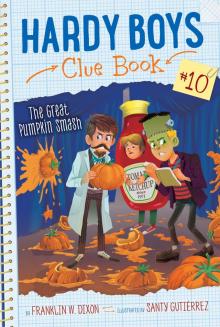 The Great Pumpkin Smash
The Great Pumpkin Smash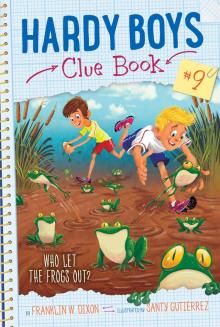 Who Let the Frogs Out?
Who Let the Frogs Out?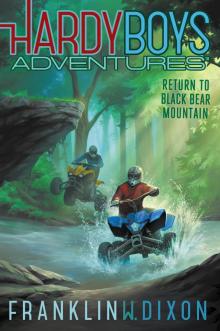 Return to Black Bear Mountain
Return to Black Bear Mountain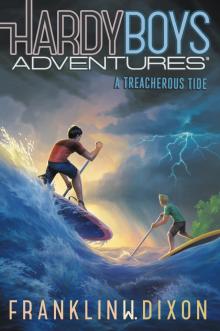 A Treacherous Tide
A Treacherous Tide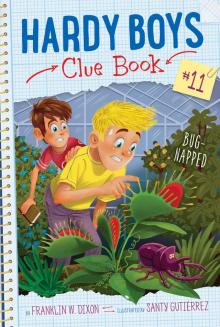 Bug-Napped
Bug-Napped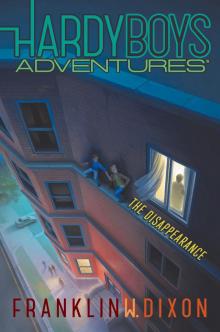 The Disappearance
The Disappearance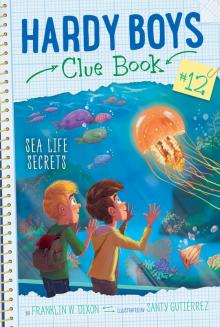 Sea Life Secrets
Sea Life Secrets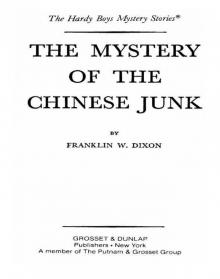 The Mystery of the Chinese Junk
The Mystery of the Chinese Junk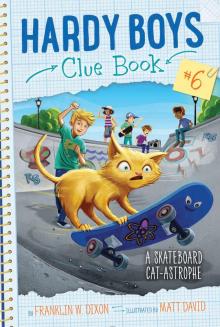 A Skateboard Cat-astrophe
A Skateboard Cat-astrophe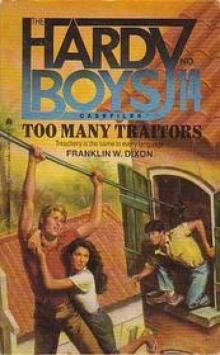 Too Many Traitors
Too Many Traitors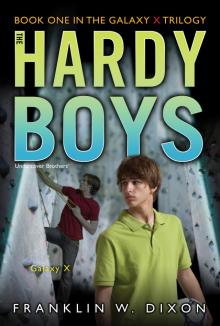 Galaxy X
Galaxy X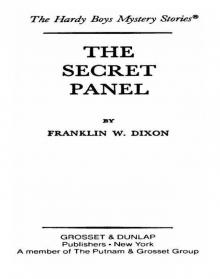 The Secret Panel
The Secret Panel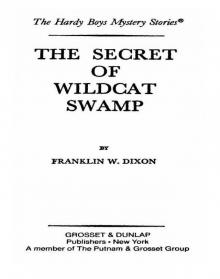 The Secret of Wildcat Swamp
The Secret of Wildcat Swamp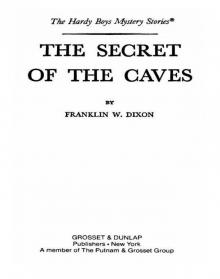 The Secret of the Caves
The Secret of the Caves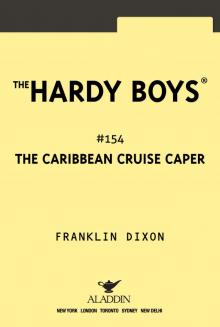 The Caribbean Cruise Caper
The Caribbean Cruise Caper Without a Trace
Without a Trace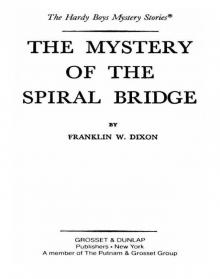 The Mystery of the Spiral Bridge
The Mystery of the Spiral Bridge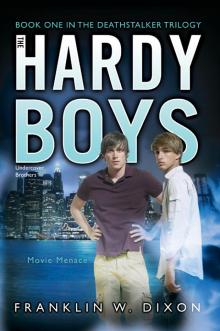 Movie Menace
Movie Menace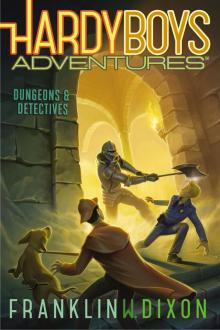 Dungeons & Detectives
Dungeons & Detectives Water-Ski Wipeout
Water-Ski Wipeout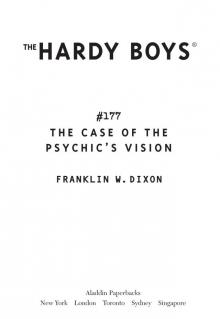 The Case of the Psychic's Vision
The Case of the Psychic's Vision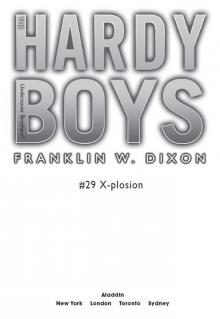 X-plosion
X-plosion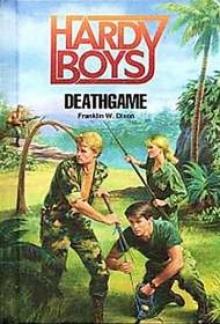 Deathgame
Deathgame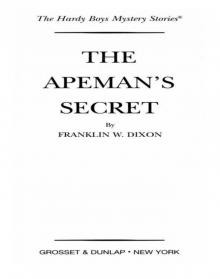 The Apeman's Secret
The Apeman's Secret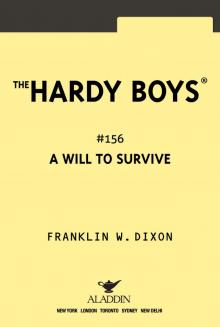 A Will to Survive
A Will to Survive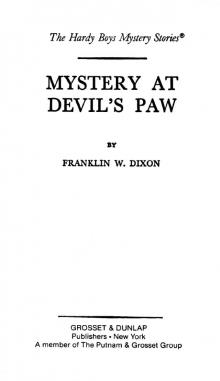 Mystery at Devil's Paw
Mystery at Devil's Paw Blood Money
Blood Money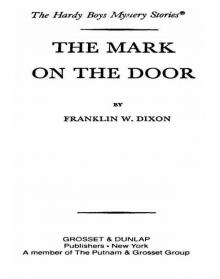 The Mark on the Door
The Mark on the Door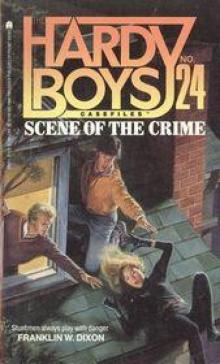 Scene of the Crime
Scene of the Crime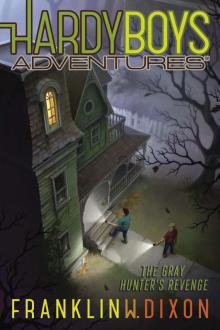 The Gray Hunter's Revenge
The Gray Hunter's Revenge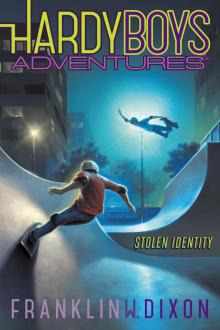 Stolen Identity
Stolen Identity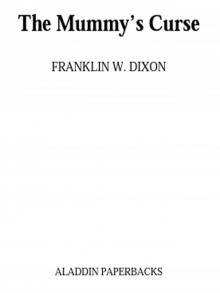 The Mummy's Curse
The Mummy's Curse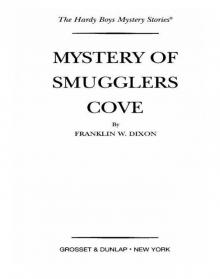 Mystery of Smugglers Cove
Mystery of Smugglers Cove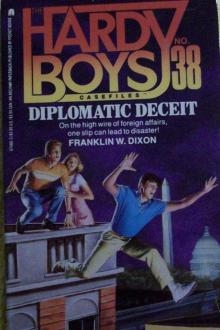 Diplomatic Deceit
Diplomatic Deceit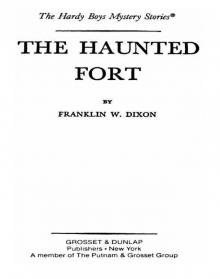 The Haunted Fort
The Haunted Fort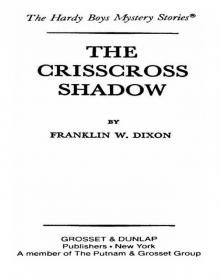 The Crisscross Shadow
The Crisscross Shadow Secret of the Red Arrow
Secret of the Red Arrow Trial and Terror
Trial and Terror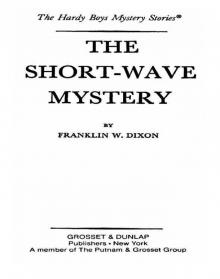 The Short-Wave Mystery
The Short-Wave Mystery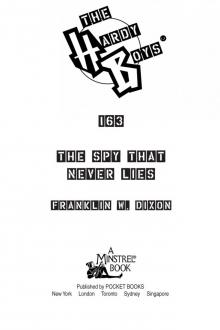 The Spy That Never Lies
The Spy That Never Lies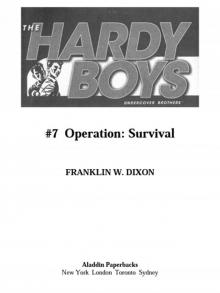 Operation: Survival
Operation: Survival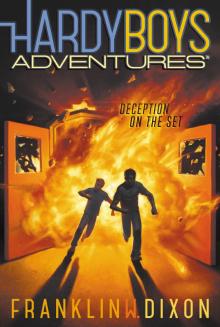 Deception on the Set
Deception on the Set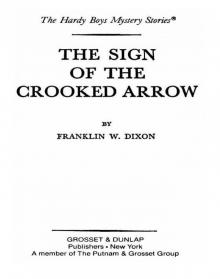 The Sign of the Crooked Arrow
The Sign of the Crooked Arrow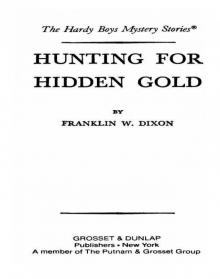 Hunting for Hidden Gold
Hunting for Hidden Gold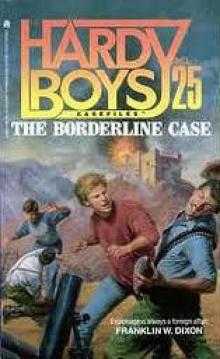 Disaster for Hire
Disaster for Hire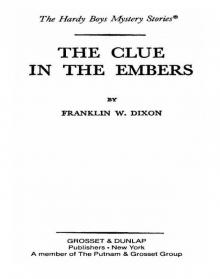 The Clue in the Embers
The Clue in the Embers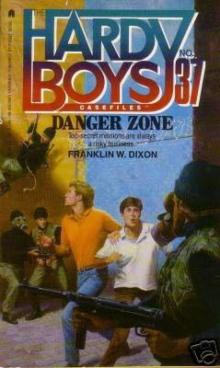 Danger Zone
Danger Zone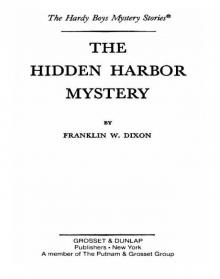 The Hidden Harbor Mystery
The Hidden Harbor Mystery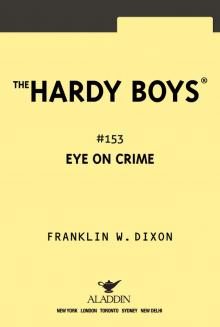 Eye on Crime
Eye on Crime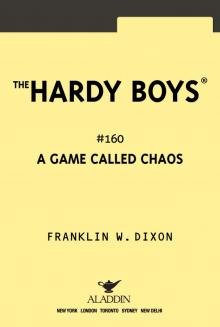 A Game Called Chaos
A Game Called Chaos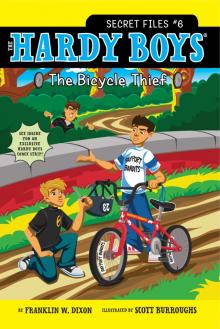 The Bicycle Thief
The Bicycle Thief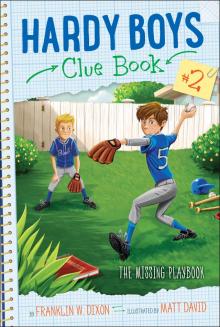 The Missing Playbook
The Missing Playbook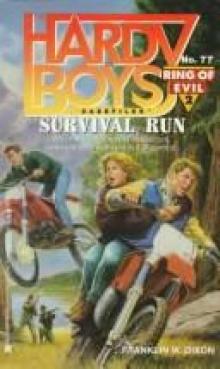 Survival Run
Survival Run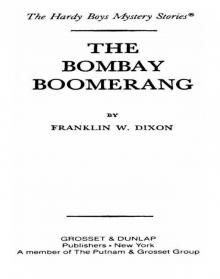 The Bombay Boomerang
The Bombay Boomerang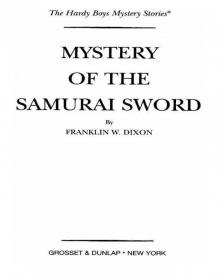 Mystery of the Samurai Sword
Mystery of the Samurai Sword Burned
Burned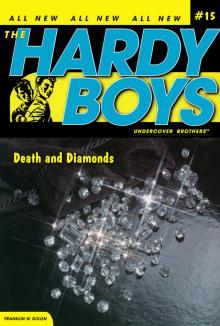 Death and Diamonds
Death and Diamonds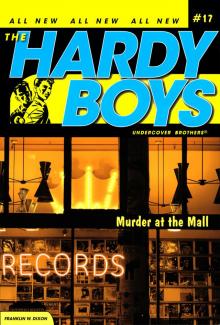 Murder at the Mall
Murder at the Mall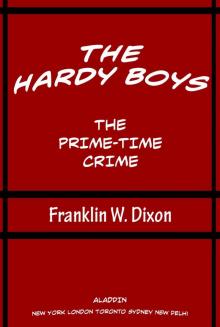 The Prime-Time Crime
The Prime-Time Crime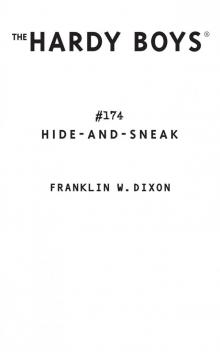 Hide-and-Sneak
Hide-and-Sneak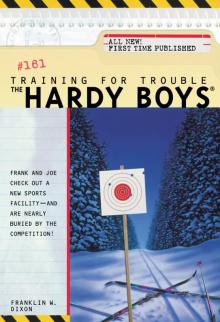 Training for Trouble
Training for Trouble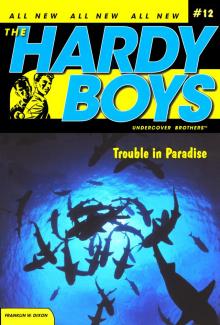 Trouble in Paradise
Trouble in Paradise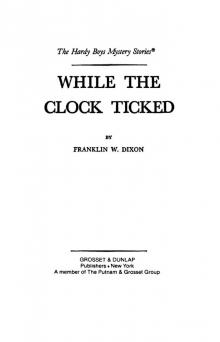 While the Clock Ticked
While the Clock Ticked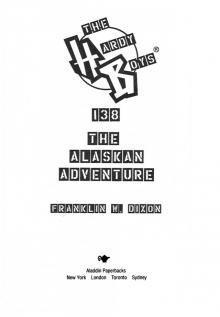 The Alaskan Adventure
The Alaskan Adventure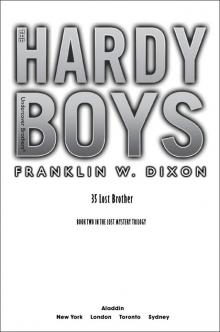 The Lost Brother
The Lost Brother Tunnel of Secrets
Tunnel of Secrets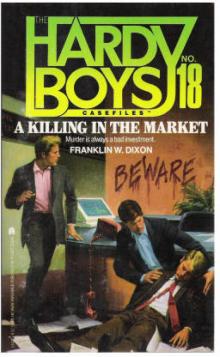 A Killing in the Market
A Killing in the Market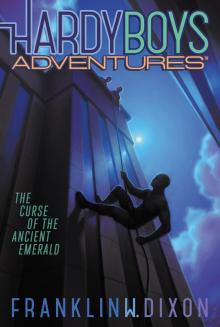 The Curse of the Ancient Emerald
The Curse of the Ancient Emerald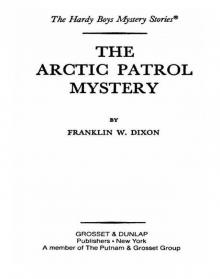 The Arctic Patrol Mystery
The Arctic Patrol Mystery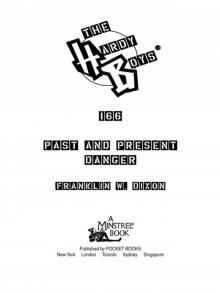 Past and Present Danger
Past and Present Danger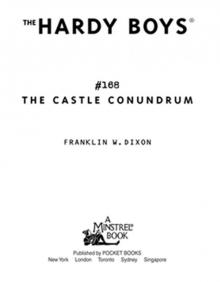 The Castle Conundrum (Hardy Boys)
The Castle Conundrum (Hardy Boys)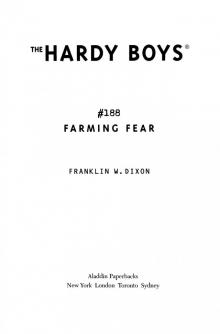 Farming Fear
Farming Fear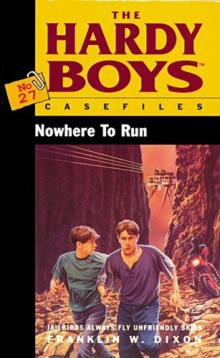 Nowhere to Run
Nowhere to Run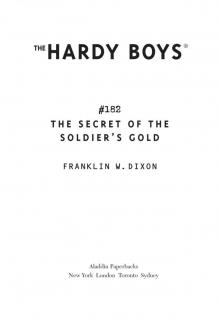 The Secret of the Soldier's Gold
The Secret of the Soldier's Gold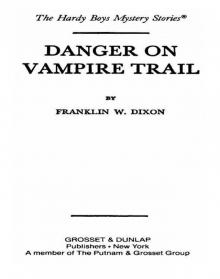 Danger on Vampire Trail
Danger on Vampire Trail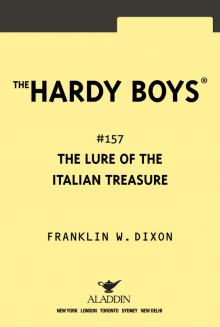 The Lure of the Italian Treasure
The Lure of the Italian Treasure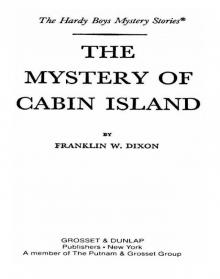 The Mystery of Cabin Island
The Mystery of Cabin Island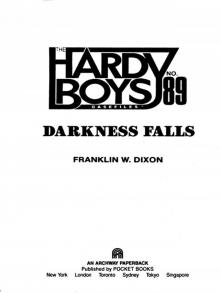 Darkness Falls
Darkness Falls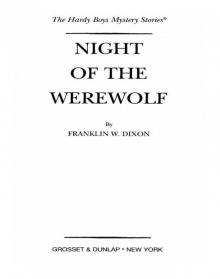 Night of the Werewolf
Night of the Werewolf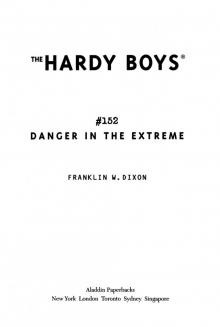 Danger in the Extreme
Danger in the Extreme The Lazarus Plot
The Lazarus Plot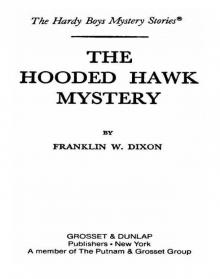 The Hooded Hawk Mystery
The Hooded Hawk Mystery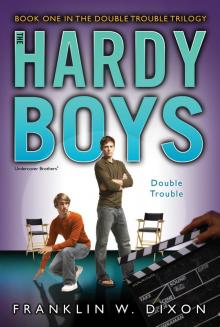 Double Trouble
Double Trouble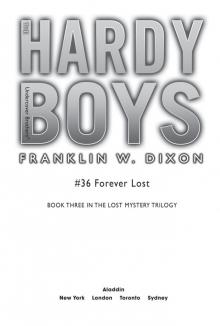 Forever Lost
Forever Lost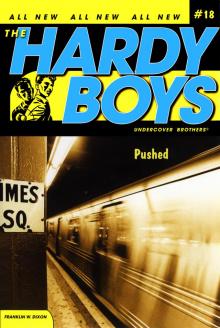 Pushed
Pushed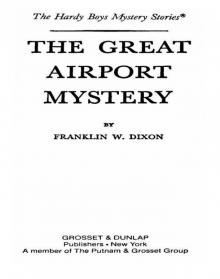 The Great Airport Mystery
The Great Airport Mystery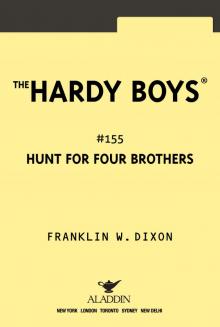 The Hunt for Four Brothers
The Hunt for Four Brothers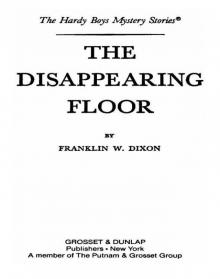 The Disappearing Floor
The Disappearing Floor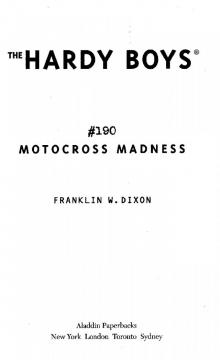 Motocross Madness
Motocross Madness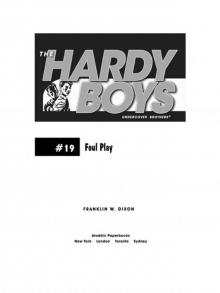 Foul Play
Foul Play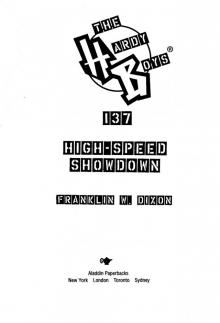 High-Speed Showdown
High-Speed Showdown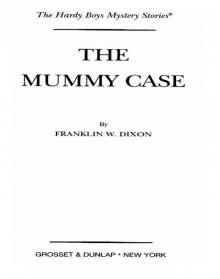 The Mummy Case
The Mummy Case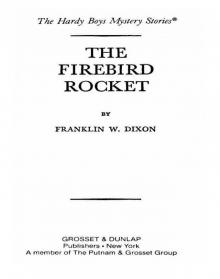 The Firebird Rocket
The Firebird Rocket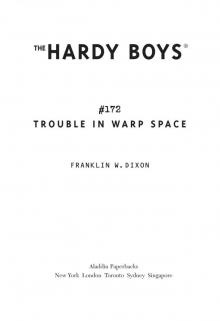 Trouble in Warp Space
Trouble in Warp Space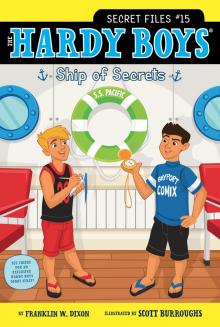 Ship of Secrets
Ship of Secrets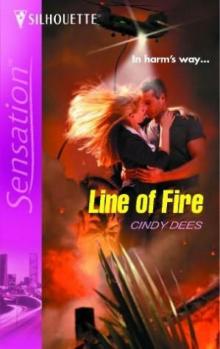 Line of Fire
Line of Fire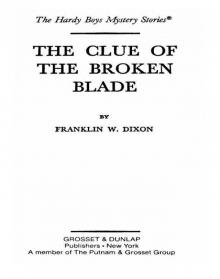 The Clue of the Broken Blade
The Clue of the Broken Blade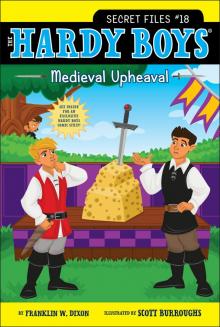 Medieval Upheaval
Medieval Upheaval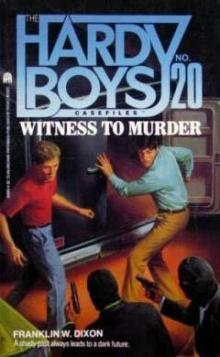 Witness to Murder
Witness to Murder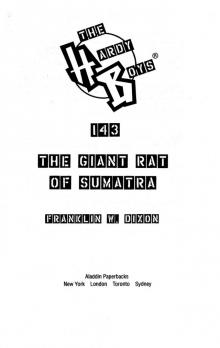 The Giant Rat of Sumatra
The Giant Rat of Sumatra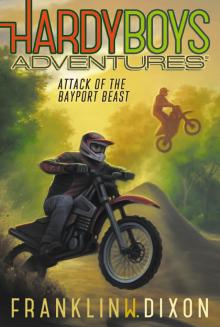 Attack of the Bayport Beast
Attack of the Bayport Beast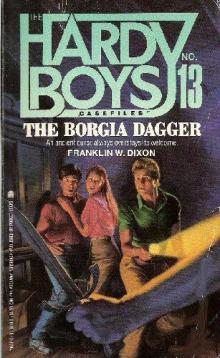 The Borgia Dagger
The Borgia Dagger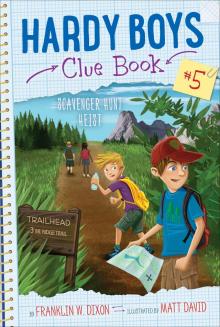 Scavenger Hunt Heist
Scavenger Hunt Heist No Way Out
No Way Out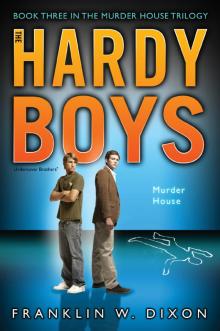 Murder House
Murder House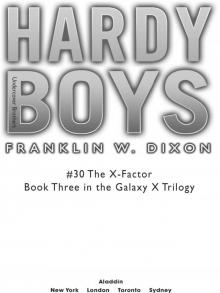 The X-Factor
The X-Factor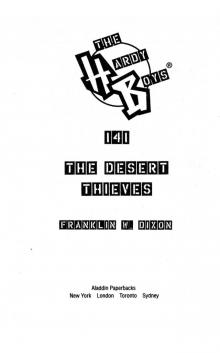 The Desert Thieves
The Desert Thieves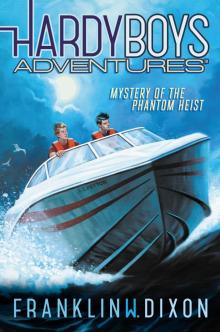 Mystery of the Phantom Heist
Mystery of the Phantom Heist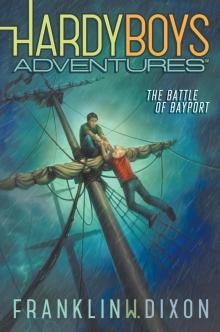 The Battle of Bayport
The Battle of Bayport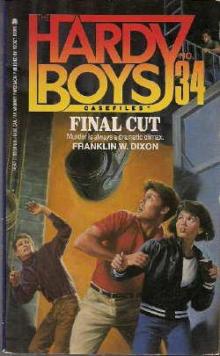 Final Cut
Final Cut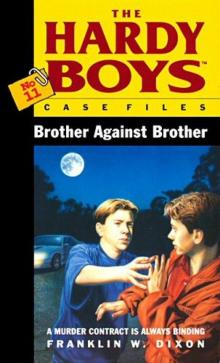 Brother Against Brother
Brother Against Brother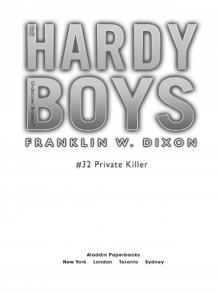 Private Killer
Private Killer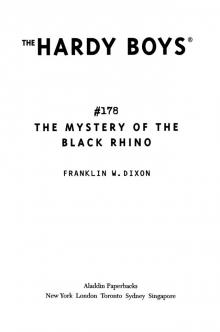 The Mystery of the Black Rhino
The Mystery of the Black Rhino Feeding Frenzy
Feeding Frenzy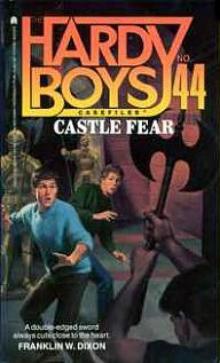 Castle Fear
Castle Fear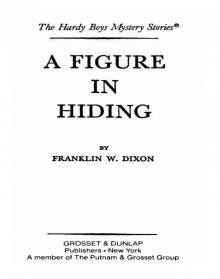 A Figure in Hiding
A Figure in Hiding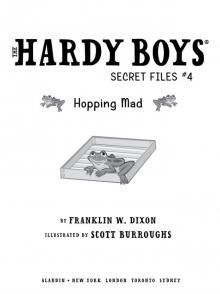 Hopping Mad
Hopping Mad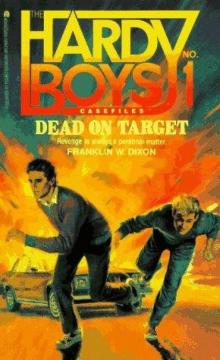 Dead on Target
Dead on Target Skin and Bones
Skin and Bones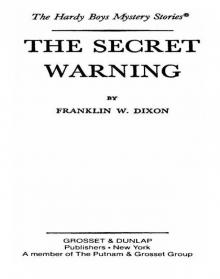 The Secret Warning
The Secret Warning Flesh and Blood
Flesh and Blood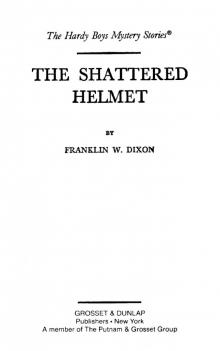 The Shattered Helmet
The Shattered Helmet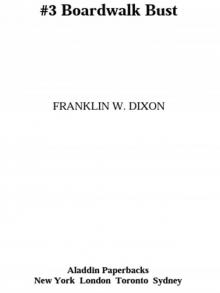 Boardwalk Bust
Boardwalk Bust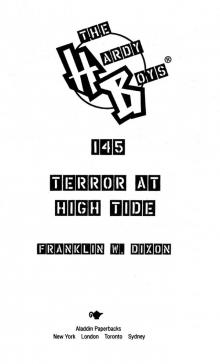 Terror at High Tide
Terror at High Tide In Plane Sight
In Plane Sight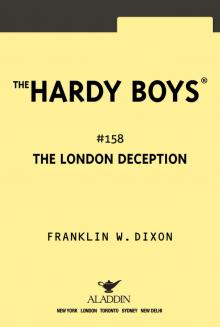 The London Deception
The London Deception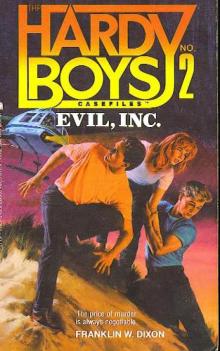 Evil, Inc.
Evil, Inc.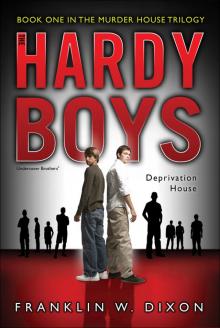 Deprivation House
Deprivation House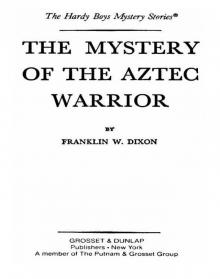 The Mystery of the Aztec Warrior
The Mystery of the Aztec Warrior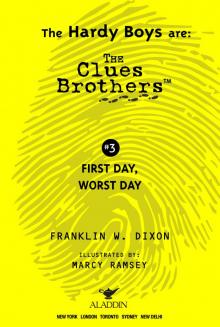 First Day, Worst Day
First Day, Worst Day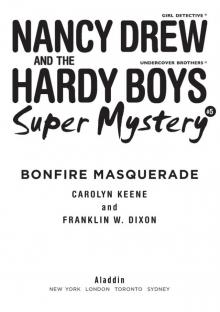 Bonfire Masquerade
Bonfire Masquerade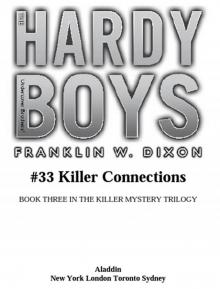 Killer Connections
Killer Connections Strategic Moves
Strategic Moves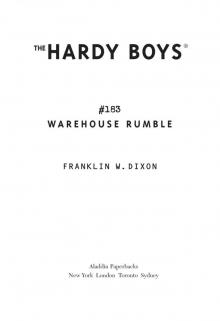 Warehouse Rumble
Warehouse Rumble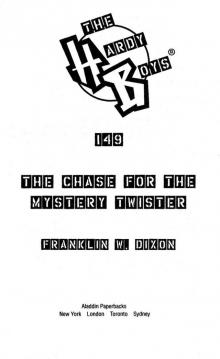 The Chase for the Mystery Twister
The Chase for the Mystery Twister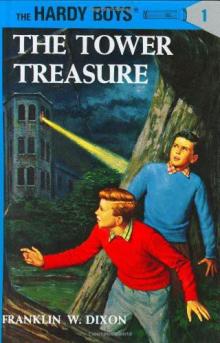 The Tower Treasure thb-1
The Tower Treasure thb-1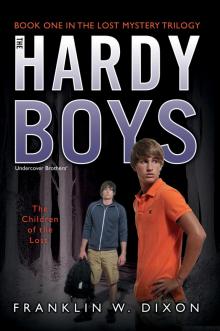 The Children of the Lost
The Children of the Lost The Last Laugh
The Last Laugh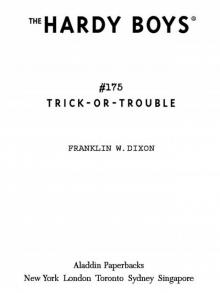 Trick-or-Trouble
Trick-or-Trouble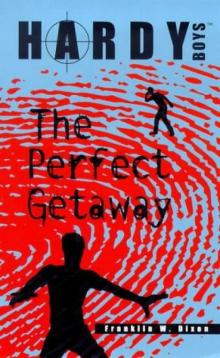 Perfect Getaway
Perfect Getaway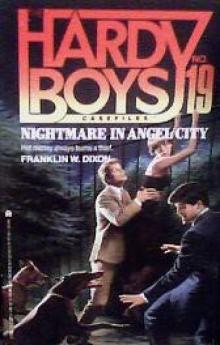 Nightmare in Angel City
Nightmare in Angel City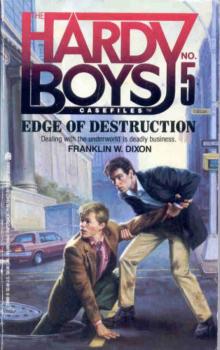 Edge of Destruction
Edge of Destruction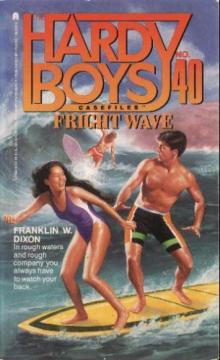 Fright Wave
Fright Wave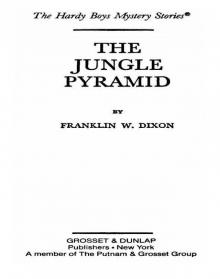 The Jungle Pyramid
The Jungle Pyramid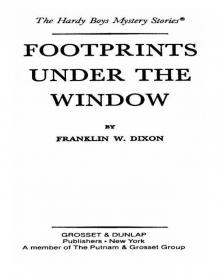 Footprints Under the Window
Footprints Under the Window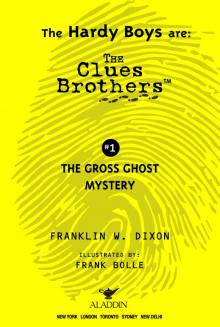 The Gross Ghost Mystery
The Gross Ghost Mystery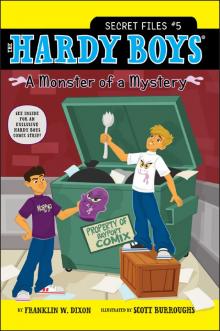 A Monster of a Mystery
A Monster of a Mystery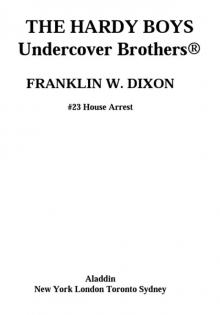 House Arrest
House Arrest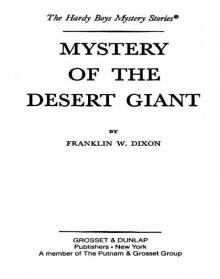 Mystery of the Desert Giant
Mystery of the Desert Giant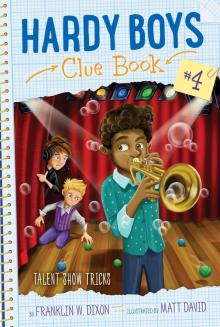 Talent Show Tricks
Talent Show Tricks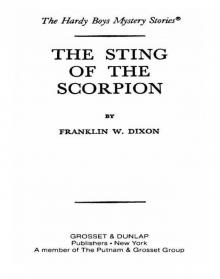 The Sting of the Scorpion
The Sting of the Scorpion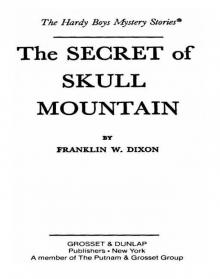 The Secret of Skull Mountain
The Secret of Skull Mountain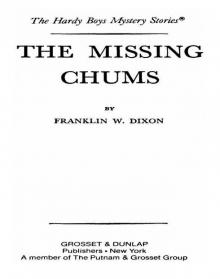 The Missing Chums
The Missing Chums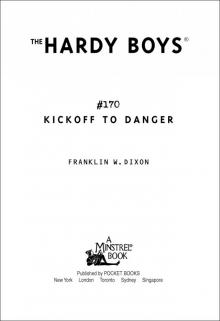 Kickoff to Danger
Kickoff to Danger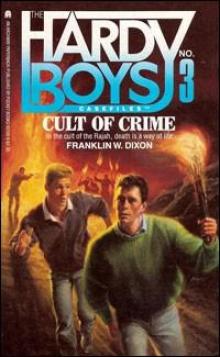 Cult of Crime
Cult of Crime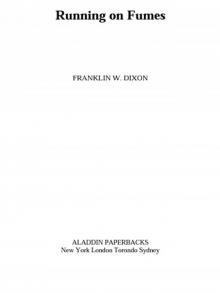 Running on Fumes
Running on Fumes Martial Law
Martial Law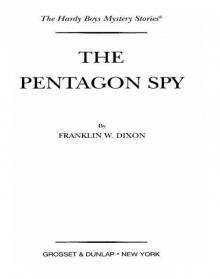 The Pentagon Spy
The Pentagon Spy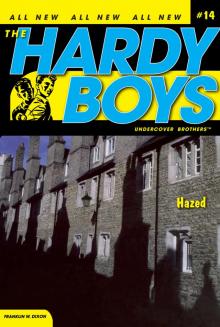 Hazed
Hazed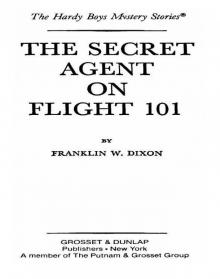 The Secret Agent on Flight 101
The Secret Agent on Flight 101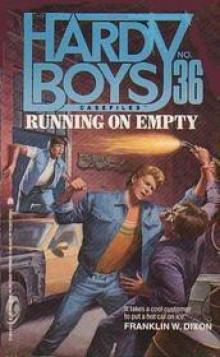 Running on Empty
Running on Empty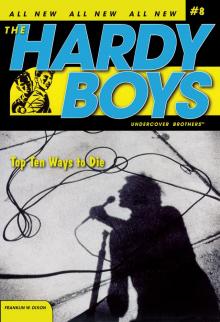 Top Ten Ways to Die
Top Ten Ways to Die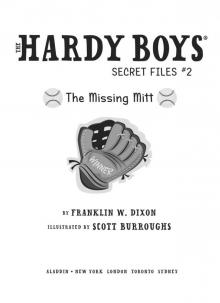 The Missing Mitt
The Missing Mitt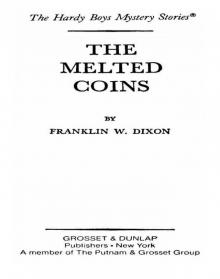 The Melted Coins
The Melted Coins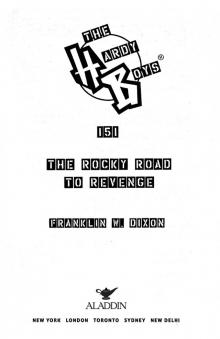 The Rocky Road to Revenge
The Rocky Road to Revenge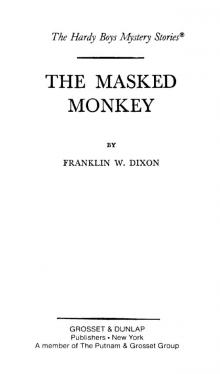 The Masked Monkey
The Masked Monkey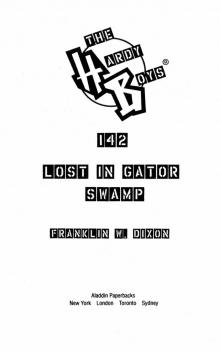 Lost in Gator Swamp
Lost in Gator Swamp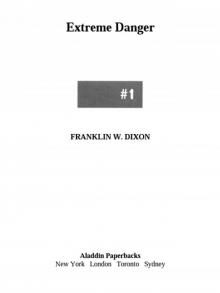 Extreme Danger
Extreme Danger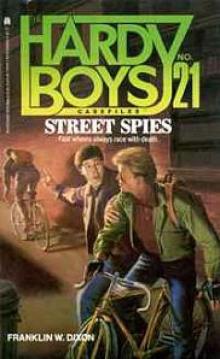 Street Spies
Street Spies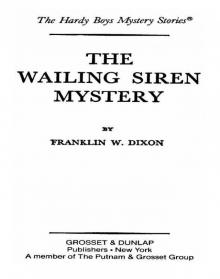 The Wailing Siren Mystery
The Wailing Siren Mystery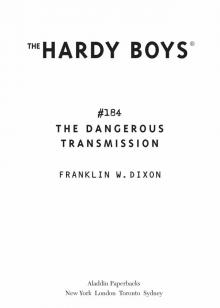 The Dangerous Transmission
The Dangerous Transmission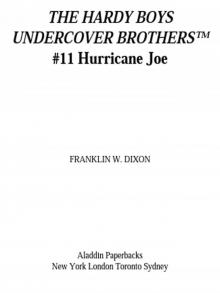 Hurricane Joe
Hurricane Joe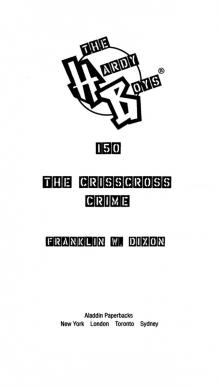 The Crisscross Crime
The Crisscross Crime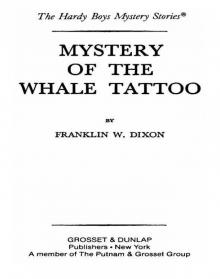 Mystery of the Whale Tattoo
Mystery of the Whale Tattoo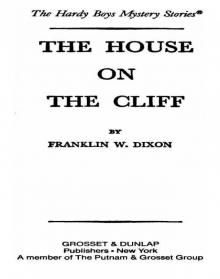 The House on the Cliff
The House on the Cliff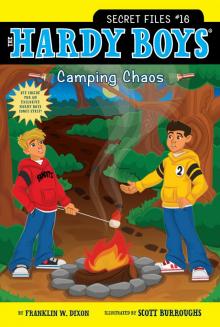 Camping Chaos
Camping Chaos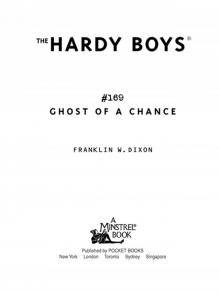 Ghost of a Chance
Ghost of a Chance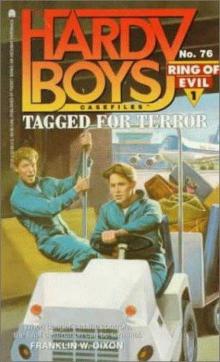 Tagged for Terror
Tagged for Terror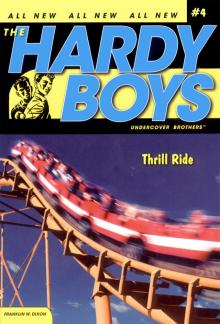 Thrill Ride
Thrill Ride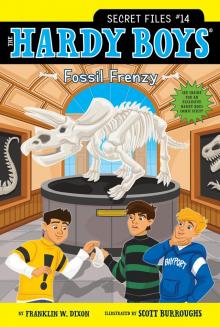 Fossil Frenzy
Fossil Frenzy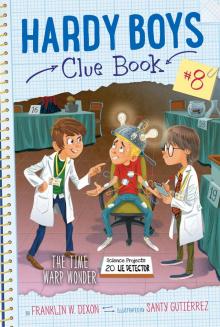 The Time Warp Wonder
The Time Warp Wonder Ghost Stories
Ghost Stories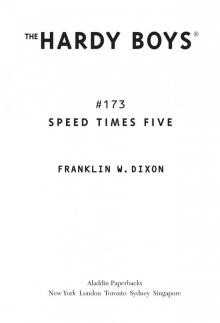 Speed Times Five
Speed Times Five What Happened at Midnight
What Happened at Midnight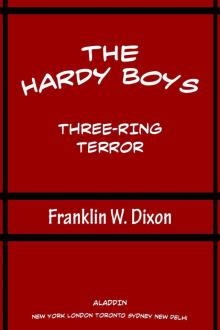 Three-Ring Terror
Three-Ring Terror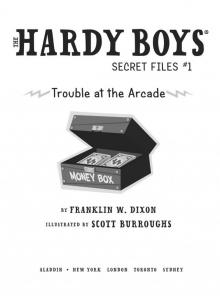 Trouble at the Arcade
Trouble at the Arcade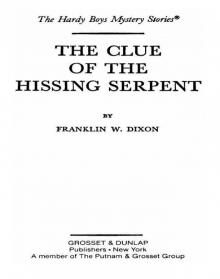 The Clue of the Hissing Serpent
The Clue of the Hissing Serpent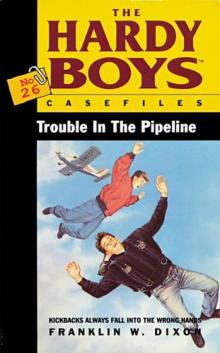 Trouble in the Pipeline
Trouble in the Pipeline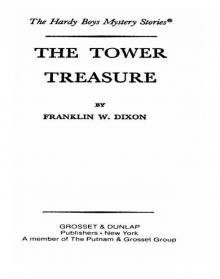 The Tower Treasure
The Tower Treasure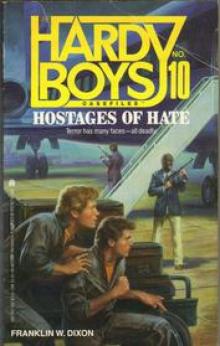 Hostages of Hate
Hostages of Hate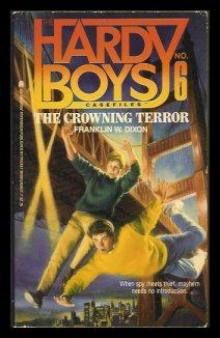 The Crowning Terror
The Crowning Terror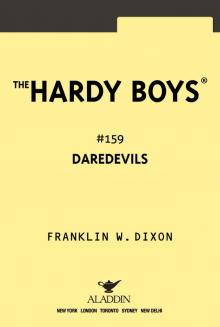 Daredevils
Daredevils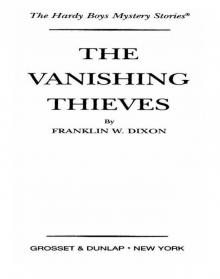 The Vanishing Thieves
The Vanishing Thieves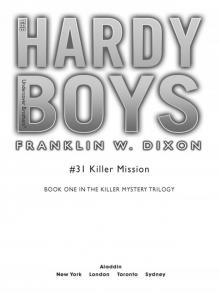 Killer Mission
Killer Mission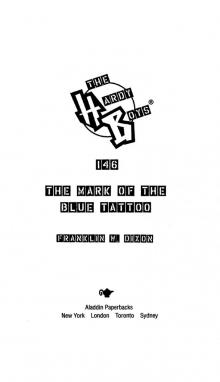 The Mark of the Blue Tattoo
The Mark of the Blue Tattoo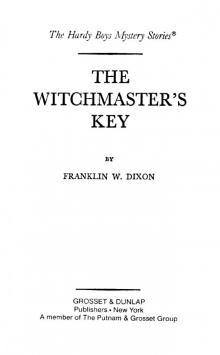 The Witchmaster's Key
The Witchmaster's Key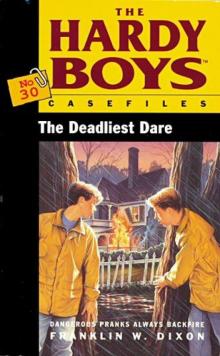 The Deadliest Dare
The Deadliest Dare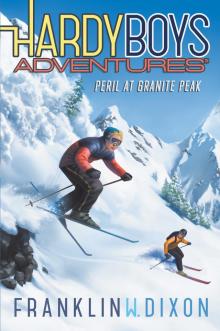 Peril at Granite Peak
Peril at Granite Peak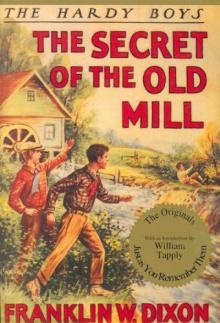 The Secret Of The Old Mill thb-3
The Secret Of The Old Mill thb-3 Rocky Road
Rocky Road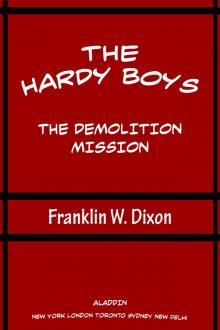 The Demolition Mission
The Demolition Mission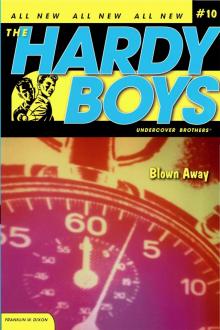 Blown Away
Blown Away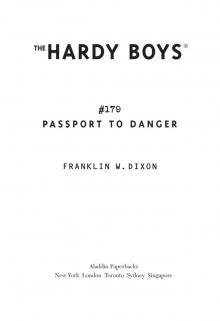 Passport to Danger
Passport to Danger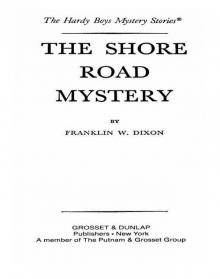 The Shore Road Mystery
The Shore Road Mystery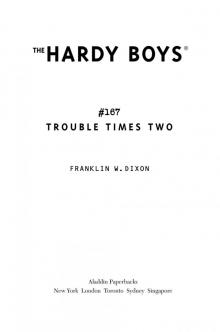 Trouble Times Two
Trouble Times Two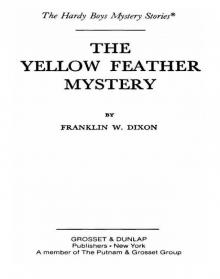 The Yellow Feather Mystery
The Yellow Feather Mystery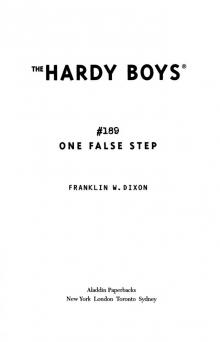 One False Step
One False Step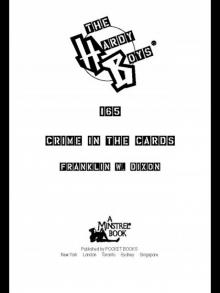 Crime in the Cards
Crime in the Cards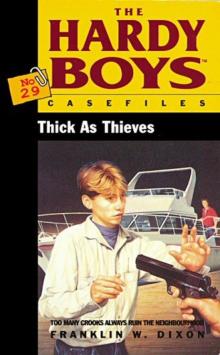 Thick as Thieves
Thick as Thieves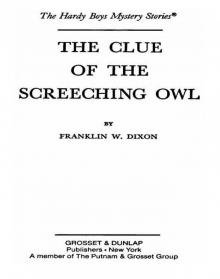 The Clue of the Screeching Owl
The Clue of the Screeching Owl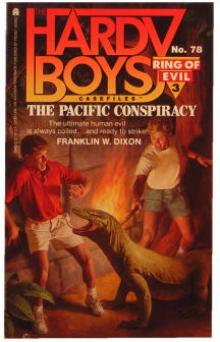 The Pacific Conspiracy
The Pacific Conspiracy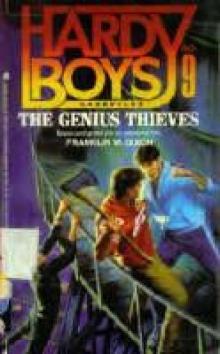 The Genius Thieves
The Genius Thieves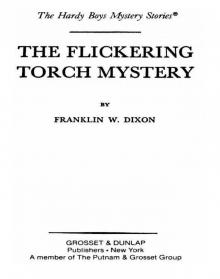 The Flickering Torch Mystery
The Flickering Torch Mystery Into Thin Air
Into Thin Air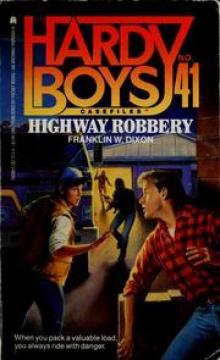 Highway Robbery
Highway Robbery Deadfall
Deadfall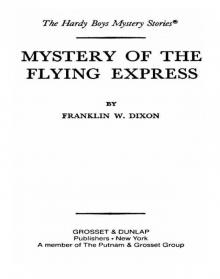 Mystery of the Flying Express
Mystery of the Flying Express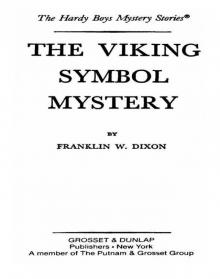 The Viking Symbol Mystery
The Viking Symbol Mystery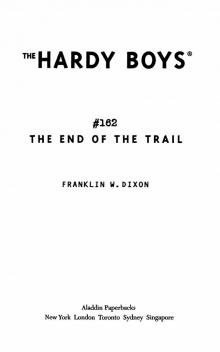 The End of the Trail
The End of the Trail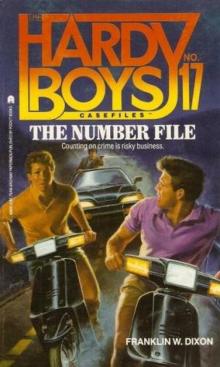 The Number File
The Number File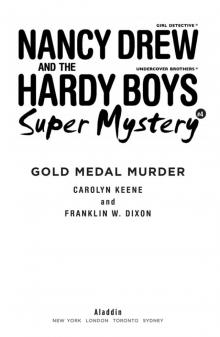 Gold Medal Murder
Gold Medal Murder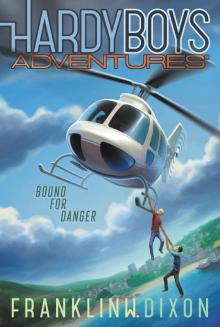 Bound for Danger
Bound for Danger Collision Course
Collision Course The Madman of Black Bear Mountain
The Madman of Black Bear Mountain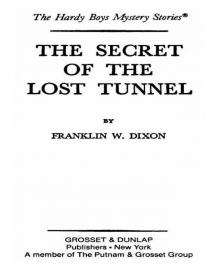 The Secret of the Lost Tunnel
The Secret of the Lost Tunnel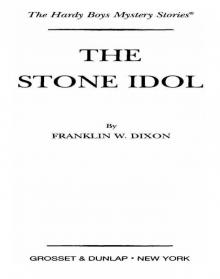 The Stone Idol
The Stone Idol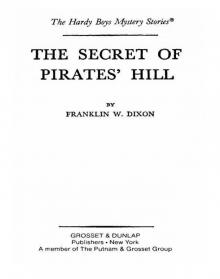 The Secret of Pirates' Hill
The Secret of Pirates' Hill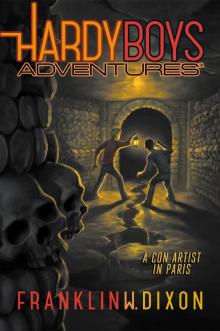 A Con Artist in Paris
A Con Artist in Paris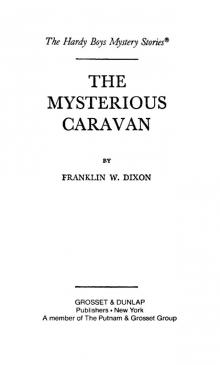 The Mysterious Caravan
The Mysterious Caravan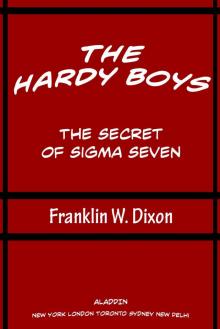 The Secret of Sigma Seven
The Secret of Sigma Seven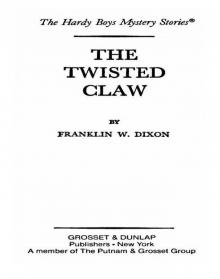 The Twisted Claw
The Twisted Claw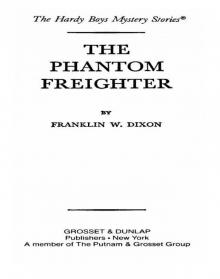 The Phantom Freighter
The Phantom Freighter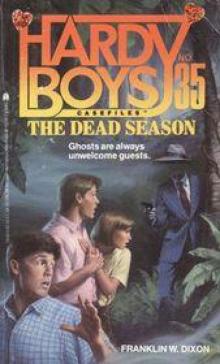 The Dead Season
The Dead Season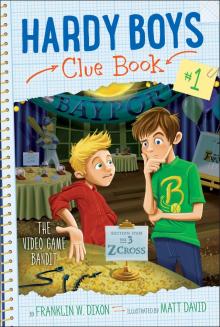 The Video Game Bandit
The Video Game Bandit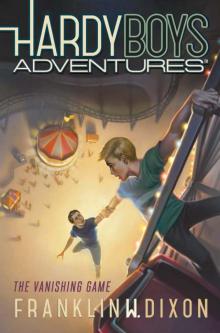 The Vanishing Game
The Vanishing Game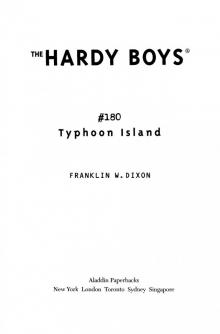 Typhoon Island
Typhoon Island